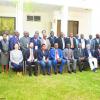News
Displaying Results 101 - 125 of 341
UNECE and the European Union continue to support pilot applications of the Strategic Environmental Assessments (SEA) in Belarus and Georgia in the framework of the European Union Water Initiative Plus programme for the Eastern Partnership Countries (EUWI+). SEA is an essential planning tool for…
Energy and water resources are integrally related and strongly interdependent. Facilitating their integrated management and monitoring can therefore offer an important foundation for sustainable development. The United Nations Framework Classification of Resources (UNFC), developed at UNECE, can…
The Water Convention has facilitated the First round of Technical & Planning Negotiations of the Draft ‘Agreement on the Establishment of the Luapula River and Lake Mweru Authority between the Democratic Republic of Congo (DRC) and Zambia on 18 and 19 April, concerning the transboundary Lake…
Strong cooperation between the World Bank and UNECE, which services the Convention on the Protection and Use of Transboundary Watercourses and international Lakes (Water Convention), can bring many benefits: the Convention can increase the sustainability of regional and basin cooperation…
Adapting to climate change and managing the risks of natural and technological hazards in transboundary basins has become critical, as the frequency and intensity of extreme weather events - such as floods, droughts, landslides or storms - are on the rise in the wake of the changing climate. Timely…
In the Drina River Basin, shared mainly by Bosnia and Herzegovina, Montenegro and Serbia, working together across borders and jointly addressing water and energy challenges is a key part of effective climate action and the green transition.
As part of the Sarajevo Energy and Climate Week (25-29…
On 23 May, Chad became the first African country to accede to the Convention on the Protection and Use of Transboundary Watercourses and International Lakes (Water Convention), serviced by UNECE. As a landlocked country in Central Africa, Chad faces significant water management challenges and…
The exchange of data and information on water resources in shared basins – which are home to over 40 per cent of the world’s population – is crucial for effective cooperation between countries in this critical area for sustainable development.Over 70 countries from Latin America, the Pan-…
UNECE and the QazTrade Center for Trade Policy Development are joining forces to advance sustainable trade and the circular economy in Kazakhstan. Kazakhstan is the first country in Central Asia to use the SPECA Principles of Sustainable Trade - a set of twenty principles, adopted by the countries…
Forests maintain water quality, regulate surface and ground water flows, and help to mitigate the risks of water-related disasters. Forests and water are closely connected and mutually interdependent. The way we manage our forests is key to the quality of the water we drink, to protect us from…
Regional and transboundary cooperation on water resources is an important feature of climate action and is crucial for effective climate change adaptation. These were central messages of the recent International Summit on “Water and Climate: Meeting of the Great Rivers of the World” held in Rome…
The North West Saharan Aquifer System (NWSAS) is one of the most important reserves of water in the North African Region, largely non-renewable in nature and shared by Algeria, Libya, and Tunisia. Economic and social developments of the past decades led to a significant pressure on this resource…
Given the close links between the energy, water management and environmental protection sectors, improved cooperation between the countries in Central Asia is crucial to achieve the relevant Sustainable Development goals. This was the main conclusion of the 20th session of the SPECA…
With an area of approximately 350,000 km2, the Senegalo-Mauritanian aquifer basin is the largest basin in the Atlantic margin of North-West Africa. The groundwater it contains is a strategic resource for the four aquifer States, respectively The Gambia, Guinea Bissau, Mauritania and Senegal,…
Unlocking the potential of inland water transport can support sustainable transport systems and boost social and economic development. Inland waterways such as rivers, lakes and coastal routes can provide a sustainable complement to the shipping of goods by road and rail. Transport…
An intersectoral (nexus) approach to managing water, energy, land resources and ecosystems has a significant potential to improve sustainability in the Syr Darya River Basin in Central Asia. This is the main conclusion of a technical report just issued by the United Nations Economic Commission…
About 3 billion people, over 40% of the global population, live within transboundary basins and rely on the good management of transboundary waters to secure drinking water supplies, support economic activities such as agricultural and energy production, and promote peace and stability. The…
In its follow-up to the Rio+20 process, Kazakhstan took the landmark decision to transition towards a sustainable development model. The Kazakh "Green Economy Concept" establishes a completely new development paradigm for the country.To support the transition, a four-year, €7.1-million…
How can we create new opportunities for integrated investment projects and to support sustainable development of water and energy resources in the Drina river basin, shared by Montenegro, Bosnia and Herzegovina and Serbia? How can potential trade-offs be limited in favour of harnessing…
Water-related ecosystems can be significantly impacted by climate change. At the same time, healthy and sustainable ecosystems increase our resilience to the adverse impacts of climate change because of the services they could provide. Ecosystem-based adaptation (EbA) is one of the nature-based…
Research on and monitoring of the effects of air pollution on different environmental media and health has been carried out for more than four decades under the UNECE Convention on Long-range Transboundary Air Pollution. The data and research that has emerged from these efforts is unique as it…
Water, climate and finance know no borders. This brings both challenges and opportunities. The majority of freshwater worldwide flows in transboundary basins and most climate change impacts are felt through the water cycle. Transboundary cooperation in climate change adaptation is crucial for…
Central Asian countries rely heavily on economic activities that produce, process or use hazardous substances in large quantities. Such activities encompass the extraction and processing of minerals and metals, such as gold, mercury and uranium. The waste that these activities create cannot be…
As guests of the planet, we human beings can thrive only if our host environment is thriving. We are strongly connected to it, more than we probably understand and more than we probably dare to admit.
Conversely, the ways humans treat the environment has clear negative effects on our health and…
Transboundary cooperation in climate change adaptation is crucial in preventing mal-adaptation and in making adaptation in shared basins more effective. However, many climate funds do not yet consider applications for joint interventions in transboundary basins. River basin organizations have an…







